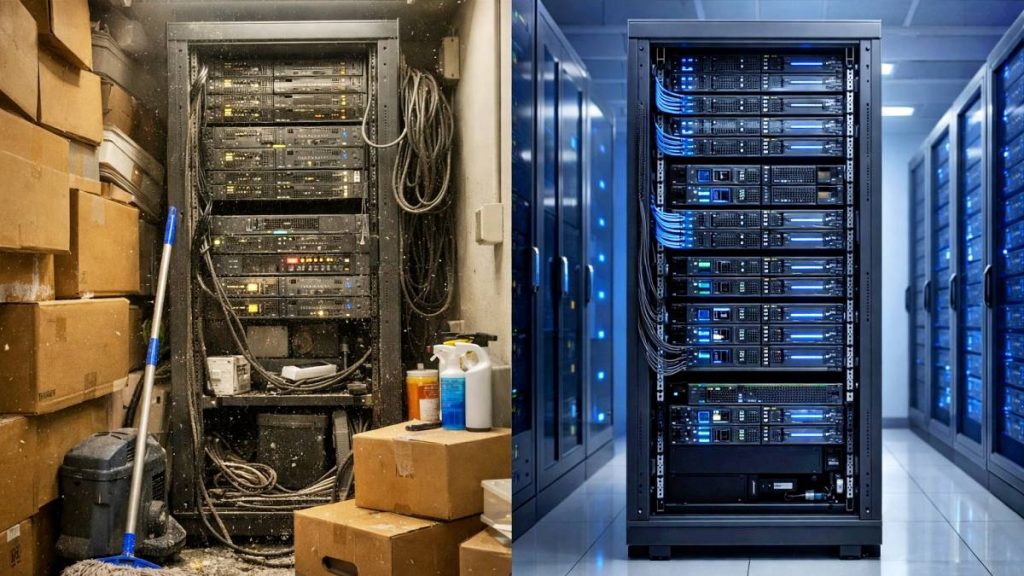The data center world is changing fast, and it’s not just about faster servers or better cooling systems. New regulations are emerging everywhere, from energy reporting requirements in Europe to privacy laws spreading across U.S. states, and they’re forcing businesses to completely rethink how they approach IT infrastructure decisions.

If you’re an IT decision-maker, you’ve probably felt the pressure. What used to be straightforward choices about performance and cost now involve complex compliance considerations that can make or break your business. Let’s break down what’s happening and how you can stay ahead of these regulatory waves.
The New Reality: Regulation is Driving IT Strategy
Gone are the days when you could select a data center solely based on uptime guarantees and monthly costs. Today’s regulatory landscape demands a more strategic approach to infrastructure decisions.
The European Union has been leading the charge with two major regulations that are setting global precedents. The revised Energy Efficiency Directive (EED) now requires data center operators across 27 EU countries to report detailed energy and water usage data on an annual basis. This is no longer voluntary; it’s mandatory, with the first compliance deadline having already passed in September 2024.
Meanwhile, the Digital Operational Resilience Act (DORA) is transforming how financial institutions in Europe manage their IT infrastructure. Starting January 2025, any company in the financial sector must have robust business continuity plans, regular security testing, and immediate incident reporting protocols in place.
Privacy Laws: The Growing Patchwork
The United States presents a different but equally challenging regulatory environment. Unlike Europe’s unified GDPR approach, the U.S. operates with a complex web of federal, state, and industry-specific rules. Currently, nineteen states have enacted their own privacy laws, each with unique requirements and compliance deadlines.
California’s Consumer Privacy Act (CCPA) was just the beginning. Now we have similar laws in Virginia, Colorado, Connecticut, and more states joining the list every year. Each law has its own definitions of personal data, consumer rights, and penalties for non-compliance.
For businesses, this means that your data center partner needs to understand not only where your data is stored, but also how different jurisdictions might impact your compliance obligations. A data center in Texas might need to comply with different requirements than one in California, even if they’re serving the same customers.
Physical Security Requirements Are Getting Stricter
Data protection isn’t just about cybersecurity: physical security requirements are becoming more stringent across multiple jurisdictions. Regulations now specify requirements for:
Access Controls: Multi-factor authentication for facility access, biometric systems, and detailed logging of who enters secure areas and when.
Surveillance Systems: 24/7 monitoring with specific retention periods for security footage, often requiring footage to be stored for several years.
Environmental Controls: Not just for equipment protection, but also for compliance with energy efficiency and environmental reporting requirements.
Incident Response: Detailed procedures for physical security breaches, including notification timelines and documentation requirements.
How Regulations Are Reshaping IT Decisions
These regulatory changes are fundamentally altering how organizations evaluate and select data center services. Here’s what’s changed:
Cost Calculations Are More Complex: You can no longer simply compare monthly fees. Compliance costs, reporting requirements, and potential penalties all factor into the total cost of ownership. A seemingly cheaper option may end up costing more if it fails to meet regulatory requirements.
Due Diligence Takes Longer: Procurement teams now need to verify that potential data center partners have the necessary certifications, reporting capabilities, and compliance procedures in place. This extends the typical evaluation timeline significantly.
Vendor Relationships Are Deeper: The days of simple colocation contracts are over. Modern agreements need detailed data processing terms, compliance monitoring provisions, and regular audit rights. You’re not just renting space: you’re entering into a compliance partnership.
Geographic Considerations Matter More: Where your data is stored affects which regulations apply. Data sovereignty laws, local privacy requirements, and energy reporting mandates all vary by location.
Energy and Environmental Compliance
Environmental regulations are becoming a significant factor in IT infrastructure decisions. The EU’s Energy Efficiency Directive requires detailed reporting on:
- Total facility energy consumption
- IT equipment energy usage
- Water consumption for cooling
- Server and storage capacity utilization
- Power usage effectiveness (PUE) metrics
This level of detail requires sophisticated monitoring systems and reporting capabilities that not all data centers currently possess. For businesses, this means verifying that your data center partner can provide the granular data you need for your own environmental reporting obligations.
The Compliance Checklist for IT Decision-Makers
When evaluating data center partners, use this checklist to ensure you’re covered:
Regulatory Coverage
- Does the provider understand the specific regulations that apply to your industry?
- Can they provide documentation of their current compliance status?
- Do they have experience with the jurisdictions where you operate?
Reporting Capabilities
- Can they provide the necessary energy and environmental data for compliance reporting?
- Do they have real-time monitoring systems in place?
- Can they generate reports in the formats required by relevant regulations?
Security and Access Controls
- Do they meet the physical security requirements for your industry?
- Can they provide detailed access logs and incident reports?
- Do they have 24/7 monitoring and response capabilities?
Contract Terms
- Does the contract include specific compliance obligations?
- Are data processing agreements clearly defined?
- Do you have audit rights and regular compliance reviews built in?
Future-Proofing
- Does the provider stay current with emerging regulations?
- Do they have a track record of adapting to new requirements?
- Can they scale their compliance capabilities as your business grows?
Staying Ahead of the Curve
The regulatory landscape will only get more complex. New privacy laws are being proposed in multiple states, energy efficiency requirements are tightening, and cybersecurity mandates are expanding across industries.
Smart organizations are treating regulatory compliance not as a checkbox exercise, but as a strategic advantage. By partnering with data center providers who understand these requirements and have the infrastructure to support ongoing compliance, you can focus on your core business instead of worrying about regulatory changes.
At Datacate, we’ve built our data center operations with compliance at the core. Our facilities are designed to meet current and emerging regulatory requirements, including energy reporting capabilities, sophisticated access controls, and monitoring systems. We work closely with our clients to ensure they have the necessary data and documentation to fulfill their own compliance obligations.
The regulatory tide is rising, but it doesn’t have to sink your IT strategy. With the right data center partner, these compliance requirements become just another managed service: handled expertly behind the scenes while you focus on growing your business.







